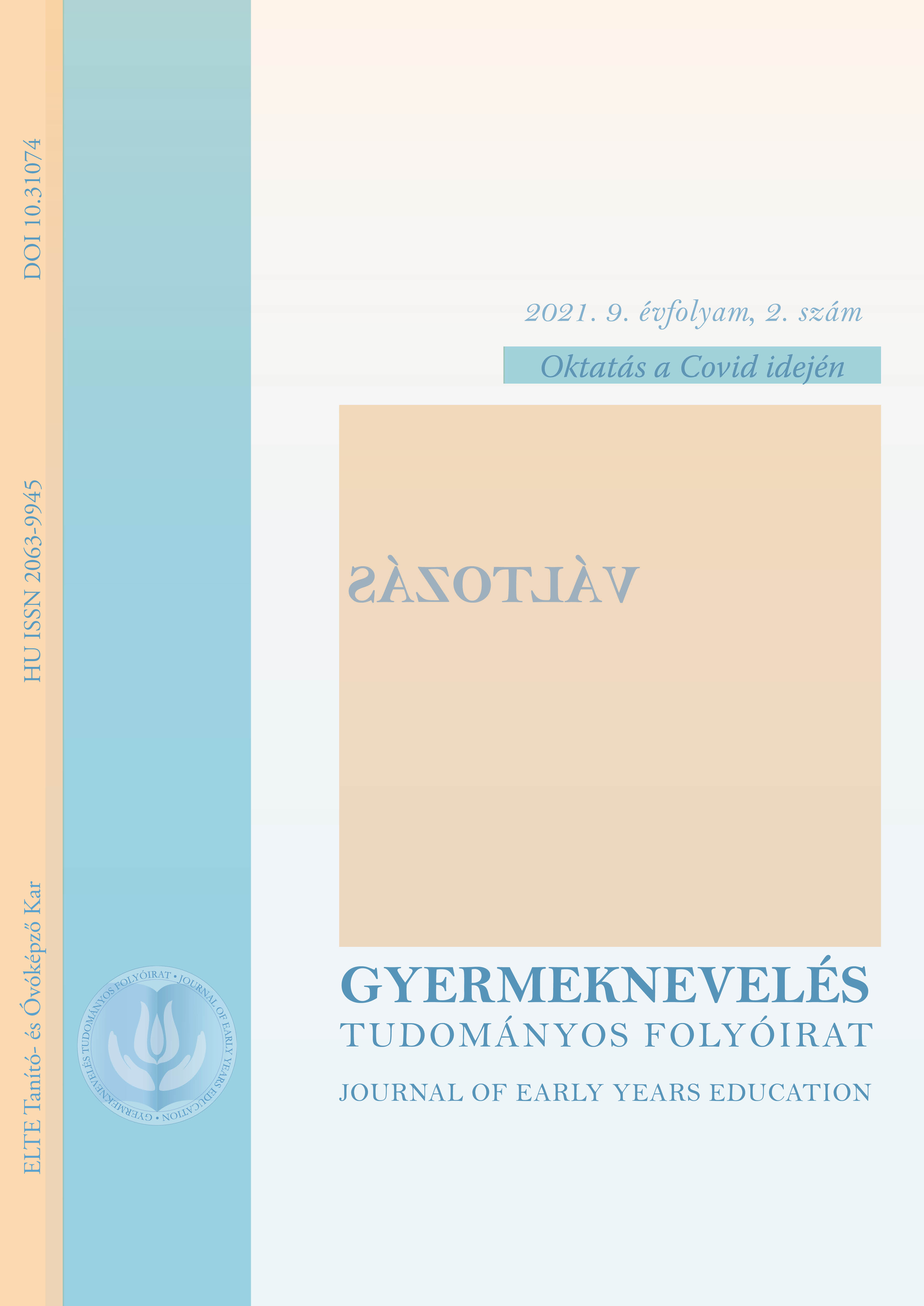Professional well-being and vision of graduate early-childhood educators
DOI:
https://doi.org/10.31074/gyntf.2021.2.5.25Keywords:
nursery, professional well-being of early-childhood educators, vision, grounded theory, qualitative content analysisAbstract
The present study concerns the professional well-being of graduate early-childhood educators and attempts to interpret the perspectives of early childhood educators in relation to their professional future. For this, it was essential to get to know their professional way of life, looking at the motives of career choice, the experiences of infant and early-childhood education training, as well as the working conditions of the nursery institutions. Our research includes 15 graduate early-childhood educators working in Újbuda Nursery Institutions, 10 of whom are also OKJ-qualified. The unexpected result of our research was that light was also shed on the distinctive features of the two levels of training. In our research we combined the individual written interviewing and the semi-structured interview. The semi-structured interviews were analyzed using Atlas.ti content analysis software, which is based on grounded theory. Our analysis follows the principles of this method, the analysis of the data – the inductive categorization – is based on the analysis strategy of Glaser (1992). The results point to the conditions that can keep early childhood educators motivated and happy in the long run in their pedagogical career, ensuring healthy professional well-being. a high professional calling is reflected in the fact that all of the early-childhood educators interviewed who work in our institution have continuing education training, some with a specific professional outlook related to the profession. Our results may provide not only important knowledge of the nursery specialty and the professionals working in its development, but the variety within the infant and early-childhood profession also offers highlights for parents.
Downloads
References
/2016. (III. 24.) EMMI rendelet a személyes gondoskodást nyújtó gyermekjóléti, gyermekvédelmi intézmények, valamint személyek szakmai feladatairól és működésük feltételeiről szóló 15/1998. (IV. 30.) NM rendelet módosításáról
Dén-Nagy, I, Géring, Zs., Király, G. & Nagy, B. (2014). Kevert módszertanok alkalmazása a munka- magánélet egyensúly kutatásában. Kultúra és Közösség, 5(3), 149–158. Corvinus kutatások. http://unipub.lib.uni-corvinus.hu/1892/ (2021. 02. 04.)
Király, G., Dén-Nagy I., Géring, Zs. & Nagy, B. (2014). Kevert módszertani megközelítések. Elméleti és módszertani alapok. Kultúra és Közösség, 5(2), 95–104. Corvinus kutatások. http://unipub.lib.uni-corvinus.hu/1895/ (2021. 02. 04.)
Kucsera, Cs. (2008). Megalapozott elmélet: egy módszertan fejlődéstörténete. Szociológiai Szemle, (3) 92–108. Magyar Szociológiai Társaság. https://szociologia.hu/dynamic/SzocSzemle_2008_3_092_108_KucsereCs.pdf (2021.02.17.)
Mitev, A. Z. (2012). Grounded theory, a kvalitatív kutatás klasszikus mérföldköve. Vezetéstudomány, 43(1), 17–30. https://doi.org/10.14267/VEZTUD.2012.01.02
Mitev, A. (2015). Elméletalkotó technika – A kutató elméletet fejleszt. Grounded Theory. In Horváth, D. & Mitev, A. (Eds.), Alternatív kvalitatív kutatási kézikönyv (pp. 85–126.). Alinea Kiadó.
Podráczky, J. (2020). A csecsemő- és kisgyermeknevelő képzés a pedagógusképzés rendszerében – az első 10 év mérlege. Gyermeknevelés Tudományos Folyóirat, 8(1), 5–14. https://doi.org/10.31074/gyntf.2020.1.5.14
Sallay, V. & Martos, T. (2018). A grounded theory (GT) módszertana. Magyar Pszichológiai Szemle, 73(1/2), 11–28. https://doi.org/10.1556/0016.2018.73.1.2
Sántha, K. (2012). Numerikus problémák a kvalitatív megbízhatósági mutatók meghatározásánál. Iskolakultúra, 22(3), 64–73. http://www.iskolakultura.hu/index.php/iskolakultura/article/view/21248 (2021. 02. 17.)
Sántha, K. (2020). Abdukció a kvalitatív tartalomelemzésben. Neveléstudomány, Oktatás – Kutatás – Innováció, 8(2), 26–36. https://doi.org/10.21549/NTNY.29.2020.2.2
Downloads
Published
How to Cite
Issue
Section
License
Copyright (c) 2021 Author

This work is licensed under a Creative Commons Attribution-NonCommercial-ShareAlike 4.0 International License.

